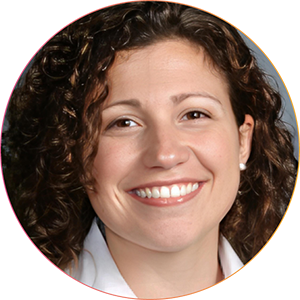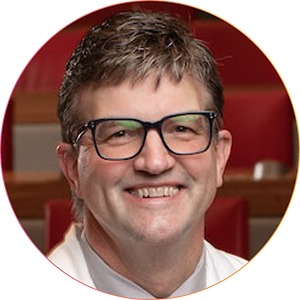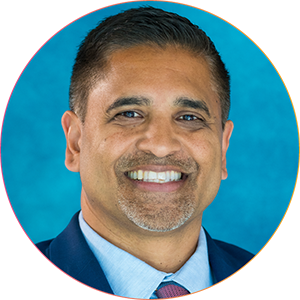The 2024 Alpha Omega Alpha Robert J. Glaser Distinguished Teacher Award recipients are Lily M. Belfi, MD, Daniel M. Clinchot, MD, Abbas A. Hyderi, MD, MPH, and Kent Vrana, PhD, FAAAS.

Lily M. Belfi, MD
Weill Cornell Medicine
For all its astonishing revelations — allowing students to literally peer into the human body to see what’s working and what’s not — radiology as a specialty is often underrepresented in medical school curricula. But at Weill Cornell Medicine (WCMC), students now have access to more robust radiology teaching throughout their medical education, thanks to Lily M. Belfi, MD, who has served as the director of medical student education in the department of radiology at WCMC in New York City for nearly 15 years.
Dr. Belfi first boosted radiology education at WCMC in 2011 when she designed and implemented a mandatory introductory clerkship in radiology that included key concepts from the Alliance of Medical Student Educators in Radiology’s national radiology curriculum. Previously, students primarily learned about medical imaging through first-year anatomy instruction and a radiology elective. The redesigned clerkship experience increased students’ exposure to the field.
In the same year, Dr. Belfi developed and piloted the Interactive Clinical Anatomy and Radiology Utilization Simulator (ICARUS), a first-of-its-kind virtual learning environment simulator that allows students to test diagnostic skills with real-life patient scenarios. Since then, more than 61,000 people from over 100 countries have visited the ICARUS website.
In 2014, Dr. Belfi founded the Clinical Radiologist Educator Alliance for Teaching Excellence Program, and subsequently designed and launched two websites to host peer-reviewed learning modules published by program participants. To date, 114 published modules have been accessed over 115,000 times.
Through these efforts and across her 16 years as a faculty member at WCMC, Dr. Belfi has achieved successful integration of radiology education throughout the preclinical curriculum and has recently expanded her efforts into the clerkship rotations. Her work in supporting radiology electives, piloting radiology teaching sessions, creating new educational resources, and developing innovative methodologies have all helped bring radiology education to students both on campus and in remote locations.
Dr. Belfi has received numerous accolades over the years, including the Weill Cornell Medical College Award for Teaching Excellence in 2013 and the Herbert M. Stauffer Award for Best Education Paper in 2016. During WCMC’s 2023 commencement, she received the Jeanne and Herbert Siegel Award for Excellence in Medical Education, the institution’s highest honor for educators.
Born and raised in New York City, Dr. Belfi earned a BA from Dartmouth College in 1998 and an MD from the School of Medicine and Science, State University of New York at Buffalo (now the Jacobs School of Medicine and Biomedical Sciences at the University at Buffalo) in 2002. Dr. Belfi completed an internship in internal medicine at Lenox Hill Hospital and a diagnostic radiology residency at Winthrop-University Hospital (now NYU Langone Hospital — Long Island) in Mineola, New York, in 2007. She then completed fellowship training in abdominal imaging at NewYork-Presbyterian/Weill Cornell Medical Center in 2008 before joining the faculty at WCMC.

Daniel M. Clinchot, MD
The Ohio State University College of Medicine
During his more than 35 years with The Ohio State University (OSU) College of Medicine, physiatrist Daniel M. Clinchot, MD, vice dean for education and inaugural chair of the department of biomedical education and anatomy at OSU College of Medicine, and professor of physical medicine and rehabilitation at OSU Wexner Medical Center, has served on virtually every major committee related to resident and student training in foundational and clinical disciplines. He has also delivered curricular design and implementation and has developed strategies for assessing learner outcomes.
Dr. Clinchot served as director of the chronic care curriculum for OSU College of Medicine from 1994 to 2003, after which he became the medical director of the Clinical Skills Education and Assessment Center from 2003 to 2009.
Named associate dean for clinical education and outreach in 2003 and continuing as the associate dean for medical education in 2009, Dr. Clinchot has combined his extensive experience in resident education with his expertise in helping faculty members become effective educators for learners who are transitioning from undergraduate education to graduate medical training.
As one of the founding faculty members of OSU College of Medicine’s undergraduate biomedical science program and a creator of one of its senior capstone courses, Dr. Clinchot has made himself indispensable to the school as the visionary leader of the “Lead.Serve.Inspire.” curriculum.
In recognition of his skill and zeal for clinical teaching while supporting residents and students, Dr. Clinchot has been named — a remarkable four times — Teacher of the Year for the Physical Medicine and Rehabilitation residency program. He also received the Excellence in Teaching Award from OSU College of Medicine and the College of Public Health in 2003 and again in 2006 from OSU College of Medicine, and the Faculty Teaching Award from the OSU College of Medicine Alumni Society in 2007. In 2010, Dr. Clinchot received the OSU College of Medicine Courage to Teach Award, and in 2015, he received the Sir William Osler, MD Award for his contributions to medical humanities and humanism in medicine. He is a recent inductee to the Gold Humanism Honor Society and has received the Shining Star Award from the office of diversity and inclusion at OSU. In 2020, he earned OSU’s prestigious Master Teacher distinction. And in addition to his many teaching awards, OSU College of Medicine won the AAMC Spencer Foreman Award for Outstanding Community Engagement in 2022, which drew attention to Dr. Clinchot’s Community Health Education course that pairs medical students with over 30 community organizations.
Dr. Clinchot earned a BS summa cum laude in 1984 from St. John’s University in Queens, New York, and an MD in 1988 from the Health Science Center at Syracuse, State University of New York. In 1992, he completed a residency in physical medicine and rehabilitation at OSU College of Medicine, where he was named chief resident in his final year.

Abbas A. Hyderi, MD, MPH
University of Pittsburgh School of Medicine
Launching a new medical school is no small undertaking, and Abbas A. Hyderi, MD, MPH, vice dean for education at the University of Pittsburgh School of Medicine (Pitt Med) and former founding senior associate dean for medical education at the Kaiser Permanente Bernard J. Tyson School of Medicine (KPSOM), played an instrumental role in helping KPSOM achieve full accreditation from the Liaison Committee on Medical Education (LCME®). The LCME accrediting authority recognizes medical education programs that lead to medical degrees in the United States and Canada.
While at KPSOM, Dr. Hyderi helped build the school from the ground up by developing the curriculum, mentoring, advising faculty, and supporting leadership and organizational growth. He also served as the KPSOM principal investigator and national cochair on a grant from the American Medical Association’s ChangeMedEd Consortium.
In his role at Pitt Med, Dr. Hyderi is responsible for overseeing accreditation; admissions; clinical education; diversity, equity, and inclusion (DEI) efforts; financial aid; global health education; graduate education (i.e., MD, MD-PhD, MD-MS, and PhD programs); and student affairs and research. Dr. Hyderi remains an active member of the AAMC Medical Education Senior Leaders Steering Committee and continues to cochair the American Medical Association grant.
A family medicine physician and a nationally known leader in education and health care, Dr. Hyderi has focused on teaching medical students how to provide care for LGBTQ+ individuals and those at risk for or living with HIV. His former colleague, Carla Lupi, MD, associate dean for assessment and evaluation at KPSOM, noted that students feel Dr. Hyderi’s passion for teaching and have described him as “the doctor I want to be.”
Dr. Hyderi authored and advocated for the passage of Oregon House Bill 2706 of the 73rd Oregon Legislative Assembly in 2005, which shifted HIV testing for pregnant women to an opt-out approach. The law went into effect in January 2006. He has also composed over 150 peer-reviewed presentations and publications on issues related to medical education, DEI, HIV, and LGBTQ+ health.
Throughout his distinguished career, Dr. Hyderi has won numerous teaching awards, including the 2010 Family Medicine Teacher of the Year Award issued by the Illinois Academy of Family Physicians and the 2016 University of Illinois College of Medicine Alumni Council Emerging Innovator of the Year Award for curricular innovation and incorporating LGBTQ+ health into the curriculum. He has also won the 2003 American Academy of Family Physicians Award for Excellence in Graduate Medical Education.
Dr. Hyderi studied biological anthropology as an undergraduate at Harvard University and received his MD from the University of Illinois College of Medicine, which gives the Abbas Hyderi Leadership Award annually to two students in each class. Dr. Hyderi completed his residency in the combined family medicine and preventive medicine program at Oregon Health & Science University, where he also earned an MPH in health administration and policy in 2005.

Kent Vrana, PhD, FAAAS
Penn State College of Medicine
As the Elliot S. Vesell professor and past-chair in the department of pharmacology at Penn State College of Medicine (PSCM), Dr. Kent Vrana has more than 35 years of research experience in molecular neuropharmacology, and has been actively involved in research to help unravel the mysteries of health conditions ranging from Parkinson’s disease to substance use disorders.
But Dr. Vrana’s influence doesn’t end in the research lab with over 200 published papers and two coauthored textbooks; his contributions to the medical education field have been just as wide-ranging.
He spent 15 years directing PSCM’s Problem-Based Learning program, which has become the primary preclinical pedagogy of the curriculum. For over 20 years, Dr. Vrana has also served on the Medical Student Academic Progress Committee, having chaired the committee for the past nine years. In this capacity, he directs institutional efforts to certify the competency of students and skillfully addresses behavioral and academic deficiencies with his empathetic leadership. He also helped create two clinical fellowship programs, one in maternal fetal medicine and the other in addiction medicine.
A mentor to scores of faculty members over the years, in 2007, Dr. Vrana created and continues to codirect the annual Grants Academy for junior faculty members, which has helped more than 200 participants obtain funding and leadership positions at PSCM and other institutions.
As a research scientist and the founding director of the PSCM Center for Cannabis and Natural Products Pharmaceutics, Dr. Vrana represents the college for professional medical societies, alumni organizations, and the lay public.
Karen Kim, MD, dean of PSCM, says, “Dr. Vrana is a master medical educator,” who has successfully reached students, residents, fellows, and faculty across his career. “His engaged and engaging style has influenced untold numbers of learners in positions throughout the world.”
For his efforts, Dr. Vrana has been recognized with several accolades and honors that have taken him to China, India, and beyond. In 2009, he was named honorary professor at the newly founded Peruvian University of Applied Science School of Medicine in Lima, Peru, and was named a PSCM Distinguished Educator. In 2015, he was elected a fellow of the American Association for the Advancement of Science. From 2013 through 2023, he served as a senior representative to the Council of Faculty and Academic Societies of the AAMC.
Dr. Vrana earned a BS in biochemistry from the University of Iowa in 1978 and a PhD in biochemistry from the Louisiana State University Medical Center in 1983. From 1983 to 1986, he was a National Institutes of Health postdoctoral fellow in the department of embryology at the Carnegie Institution of Washington (now Carnegie Science) in Baltimore. He held faculty positions at the West Virginia University Health Sciences Center and Wake Forest University School of Medicine before moving to Penn State University. In 2024, he stepped down as chair of pharmacology, following a 20-year tenure.